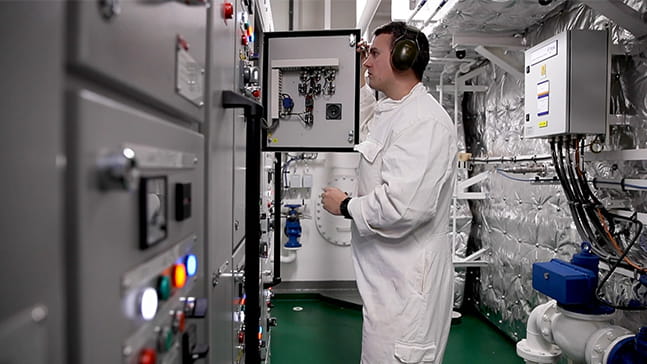Cadet Marine Engineer Officer (RFA)
Learn how our ships work, providing the power that keeps them moving. Without you, vital operations would grind to a halt.
- GCSEs
- Royal Fleet Auxiliary
- Engineering
- Officer level
Leave
Pay
Pension
Chartership
Study
Travel

I was really nervous when I started, but the people on board ship have given me so much help. It’s been great and I’ve learnt so much already.
Role details
What you’ll do
As a Cadet Marine Engineer Officer in the Royal Fleet Auxiliary (RFA), you’ll learn how our ships work, and how you can provide the power that keeps them moving. We provide essential logistical and operational support to the Royal Navy, wherever they are in the world, but without you, that vital work would grind to a halt. As soon as you’re a fully fledged Marine Engineer Officer, you’ll play a pivotal role in Replenishment at Sea operations, getting your hands on some enormous mechanical systems in the process.
Your role
- From the moment you join you’ll be training to become an Engineer Officer of the Watch, gaining all the skills you need to oversee your department’s work on our large-scale mechanical systems.
- Work alongside your crewmates from the Logistics, Deck and Systems Engineering departments, gaining a broad knowledge of how the ship works, and how your role fits in to the wider ship’s company.
- Gain hands-on experience as you maintain and repair everything from the hull, engines and power generation systems, to the water cooling and hydraulics. When you qualify you’ll be taking a managerial role, so knowing how everything works is essential.
- Become experienced in working with a mix of diesel-electric, slow and medium speed diesel propulsion systems, as you work across the RFA fleet.
Pay & benefits
- £17,500+ starting salary during training
- Earned Voyage Leave (EVL) of 7 days for every month spent on board ship
- Membership of a Civil Service Pension Scheme
- World-class training
- Potential to travel the world
Skills for life
Qualifications you'll gain
- A defined path to becoming a Chartered Engineer
- MCA certification that is fully supported by the RFA
Skills you'll develop
- A wide and varied skillset in the field of mechanical engineering
- The ability to lead and manage a highly skilled team
Eligibility
- Aged at least 17 years 6 months to apply, and 18 years to commence employment. There is no upper age limit
- 5 GCSEs including Mathematics, English Language and either Physics or Chemistry or Dual Science at GRADE 4/c OR 9-4 Scottish equivalent
- To be considered for a Foundation degree option A Levels or Scottish Advanced Higher qualifications are required but must include a numerate subject such as Mathematics
- Must be British, Irish or Commonwealth citizens. However, a number of career paths have nationality restrictions. Dual Nationality will be considered providing the first nationality is British. Note: Residency restrictions may apply
Skills & interests
- Great leadership potential
- A hands-on, common sense approach to solving problems
- First-class communication
- A sense of adventure
Joining process
From picking your role to starting on your first day, these are the steps you'll take to join as a rating.
Eligibility
Defence Aptitude Assessment (DAA)
Interview
On successful completion of the test you will be invited to Portsmouth for a Suitability that will confirm that you’re ready for the Admiralty Board (AIB)
Admiralty Interview Board (AIB)
Training
Training Part 2
You will go to an MCA Nautical college and commence your 3 year training programme
Got a question?
Our virtual recruiter is available to answer your questions 24 hours a day
